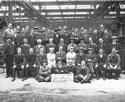 The son of a Parkhead labourer, David Kirkwood left school at the age of twelve to work in a printing works. At fourteen he started an engineering apprenticeship at Beardmore's Parkhead Forge and on its completion in 1890 he joined the Amalgamated Society of Engineers. After a strike in 1895 he was dismissed from Beardmore's, but returned there in 1910. He was active in the Union, becoming the chief shop steward at Parkhead in 1914. It was in the early years of the war that he was converted to socialism and joined the Independent Labour Party (ILP).
The son of a Parkhead labourer, David Kirkwood left school at the age of twelve to work in a printing works. At fourteen he started an engineering apprenticeship at Beardmore's Parkhead Forge and on its completion in 1890 he joined the Amalgamated Society of Engineers. After a strike in 1895 he was dismissed from Beardmore's, but returned there in 1910. He was active in the Union, becoming the chief shop steward at Parkhead in 1914. It was in the early years of the war that he was converted to socialism and joined the Independent Labour Party (ILP).
 He was never so strongly anti-war as many of the other ILP members, but amid the patriotic fervour he did not want the workers to lose pre-war gains on the length of the working day and on how jobs should be done. The desire to bring in new, unapprenticed workers into the munitions works and other pressures on the position of skilled workers led to industrial tension and to strikes and Kirkwood became a member of the Central Labour Withholding Committee. He was strongly opposed to the conditions in the Munitions Act that required skilled workers to get a "leaving certificate" from their previous employer before they could move jobs. To Kirkwood this was a "slave's clause". He was concerned, first and foremost, to defend the position of the skilled, time-served engineers and he became treasurer of the Clyde Workers' Committee of shop stewards, which sought to get some say over the running of the industry in exchange for agreeing to dilution of labour - the employment of unskilled workers to do formerly skilled jobs, a move necessary during the war years. When disputes continued, Kirkwood and five other shop stewards were deported to Edinburgh. After a year, he returned to the Mile-End Shell Factory which was soon producing record output of shells and Kirkwood became a foreman at Beardmore's.
He was never so strongly anti-war as many of the other ILP members, but amid the patriotic fervour he did not want the workers to lose pre-war gains on the length of the working day and on how jobs should be done. The desire to bring in new, unapprenticed workers into the munitions works and other pressures on the position of skilled workers led to industrial tension and to strikes and Kirkwood became a member of the Central Labour Withholding Committee. He was strongly opposed to the conditions in the Munitions Act that required skilled workers to get a "leaving certificate" from their previous employer before they could move jobs. To Kirkwood this was a "slave's clause". He was concerned, first and foremost, to defend the position of the skilled, time-served engineers and he became treasurer of the Clyde Workers' Committee of shop stewards, which sought to get some say over the running of the industry in exchange for agreeing to dilution of labour - the employment of unskilled workers to do formerly skilled jobs, a move necessary during the war years. When disputes continued, Kirkwood and five other shop stewards were deported to Edinburgh. After a year, he returned to the Mile-End Shell Factory which was soon producing record output of shells and Kirkwood became a foreman at Beardmore's.
He unsuccessfully contested Dumbarton Burghs in the general election of 1918, but was returned to the Town Council in 1919 and was one of the ILP victors in the 1922 general election. He sat for Dumbarton until 1951. There was occasional rebellion in the Commons and against the Labour leadership and he remained a strong supporter of Scottish Home Rule. But he refused to follow James Maxton and the ILP out of the Labour Party in 1932. Perhaps Kirkwood's greatest success was in persuading Cunard to have the Queen Mary built on the Clyde. Created Lord Kirkwood of Bearsden in 1951, he died in Glasgow on 16 April 1955.